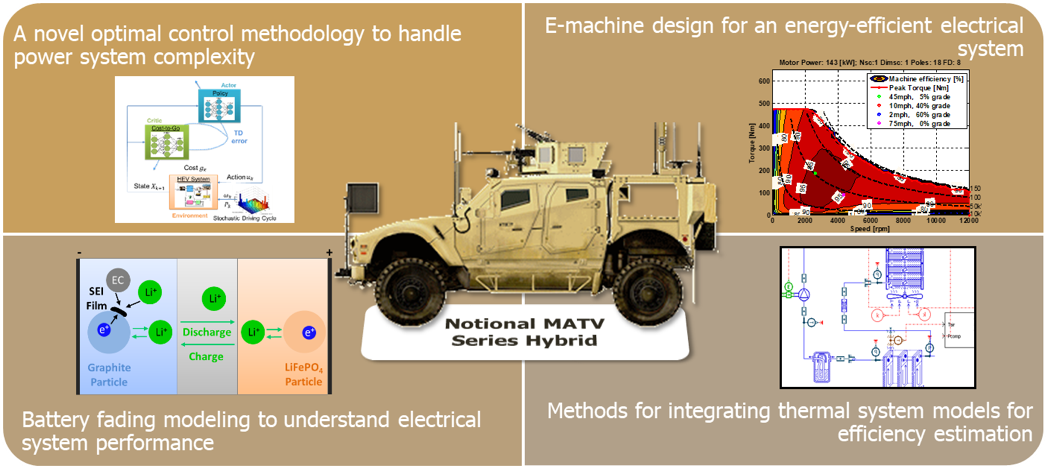Intelligent Power Systems
integrativeMulti-Objective Optimization and Thermal Management of the Vehicle Power System
Project Summary
Case study performed in 2015.
Contributors (TA 4): Andrej Ivanco, John Wagner, Zoran Filipi, Xinran (William) Tao†, Xueyu Zhang† (CU), Heath Hofmann, Kan Zhou† (UM), Denise Rizzo (GVSC), Xiao Hu (ANSYS, Inc.) (†Students)

Military vehicles have to face many challenges in modern warfare in order to fulfill their mission, of which energy consumption and thermal management are only a few. In this case study, we addressed these by developing a unified, multi-physics hybrid electric vehicle simulation tool for the next-generation of military trucks. Our approach has been enhanced with the addition of (a) a finite element electric machine model, (b) a holistic cooling system design and control for the electrified powertrain, and (c) a high-fidelity battery aging model. The new capabilities will enable development of a framework for a multi-variable, multi-objective optimization of the Vehicle Power System (VPS), with consideration of typical military duty cycles.
Main highlights include: (i) Computationally-efficient electromagnetic and thermal models for electric machines. Through the use of the model order reduction and scaling techniques, new electric machine models can be quickly generated. These models are fast enough to be used in powertrain design and controls development and enable judging the tradeoffs between best performance, high efficiency and heat rejection. (ii) A holistic supervisory thermal management was proposed to simultaneously track the prescribed temperatures inside the battery pack, e-motors, and the IC engine coolant and to minimize the auxiliary loses. (iii) Overall vehicle performance was evaluated through an implementable control strategy for VPS which allows dealing with multiple criteria including complex mechanisms of battery fading.
Publications:
K. Zhou, A. Ivanco, Z. Filipi and H. Hofmann, “Finite-Element-Based Computationally Efficient Scalable Electric Machine Model Suitable for Electrified Powertrain Simulation and Optimization,” in IEEE Transactions on Industry Applications, vol. 51, no. 6, pp. 4435-4445, Nov.-Dec. 2015.
Tao, X., Zhou, K., Ivanco, A., Wagner, J.R., Hofmann, H. and Filipi Z., “A Hybrid Electric Vehicle Thermal Management System - Nonlinear Controller Design”, SAE technical paper 2015-01-1710, 2015.

